四年级A英语笔记
- 格式:doc
- 大小:1.64 MB
- 文档页数:31
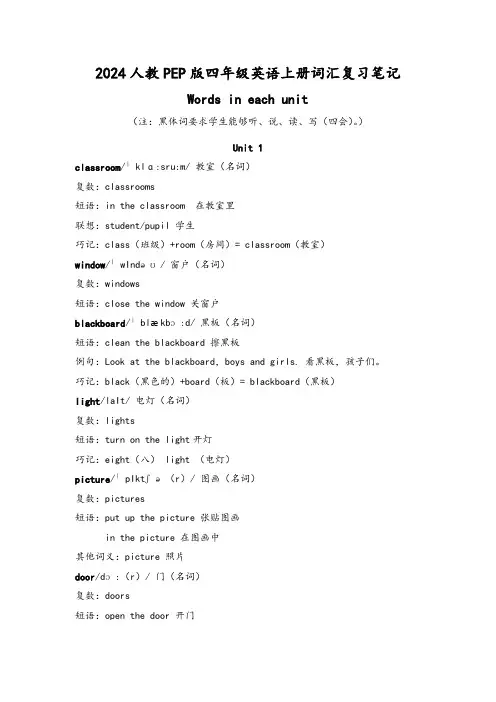
2024人教PEP版四年级英语上册词汇复习笔记Words in each unit(注:黑体词要求学生能够听、说、读、写(四会)。
)Unit 1classroom/ˈklɑ:sru:m/ 教室(名词)复数:classrooms短语:in the classroom 在教室里联想:student/pupil 学生巧记:class(班级)+room(房间)= classroom(教室)window/ˈwIndəʊ/ 窗户(名词)复数:windows短语:close the window 关窗户blackboard/ˈblækbɔ:d/ 黑板(名词)短语:clean the blackboard 擦黑板例句:Look at the blackboard,boys and girls. 看黑板,孩子们。
巧记:black(黑色的)+board(板)= blackboard(黑板)light/laIt/ 电灯(名词)复数:lights短语:turn on the light开灯巧记:eight(八) light (电灯)picture/ˈpIktʃə(r)/ 图画(名词)复数:pictures短语:put up the picture 张贴图画in the picture 在图画中其他词义:picture 照片door/dɔ:(r)/ 门(名词)复数:doors短语:open the door 开门close the door 关门teacher’s desk 讲台例句:—Where is the map?地图在哪儿?—It’s on the teacher’s desk. 在讲台上。
拓展:teachers’office 教师办公室computer/kəmˈpju:tə(r)/ 计算机(名词)复数:computers例句:I have a new computer. 我有一台新计算机。
fan/fæn/ 风扇(名词)复数:fans形近词:man 男人短语:turn on the fan 打开风扇其他词义:fan 迷;狂热爱好者wall/wɔ:l/ 墙壁(名词)复数:walls短语:on the wall在墙上例句:The walls are white. 墙壁是白色的。
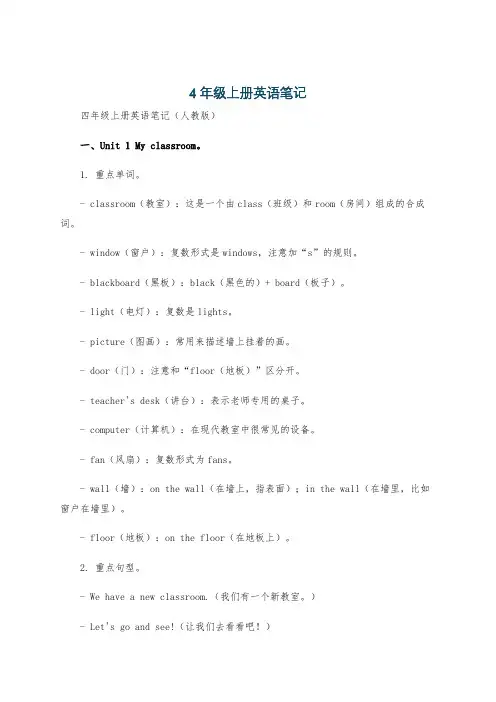
4年级上册英语笔记四年级上册英语笔记(人教版)一、Unit 1 My classroom。
1. 重点单词。
- classroom(教室):这是一个由class(班级)和room(房间)组成的合成词。
- window(窗户):复数形式是windows,注意加“s”的规则。
- blackboard(黑板):black(黑色的)+ board(板子)。
- light(电灯):复数是lights。
- picture(图画):常用来描述墙上挂着的画。
- door(门):注意和“floor(地板)”区分开。
- teacher's desk(讲台):表示老师专用的桌子。
- computer(计算机):在现代教室中很常见的设备。
- fan(风扇):复数形式为fans。
- wall(墙):on the wall(在墙上,指表面);in the wall(在墙里,比如窗户在墙里)。
- floor(地板):on the floor(在地板上)。
2. 重点句型。
- We have a new classroom.(我们有一个新教室。
)- Let's go and see!(让我们去看看吧!)- What's in the classroom?(教室里有什么?)- One blackboard, one TV, many desks and chairs...(一块黑板、一台电视、许多桌子和椅子……)- Where is it?(它在哪里?)- It's near the window.(它在窗户附近。
)二、Unit 2 My schoolbag。
1. 重点单词。
- schoolbag(书包):由school(学校)和bag(包)组成。
- maths book(数学书):maths是“数学”的缩写形式,全称为mathematics。
- English book(英语书):注意“English”的首字母要大写。
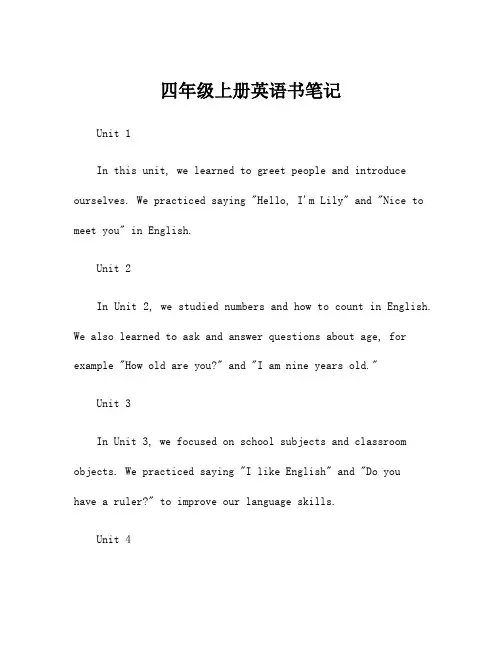
四年级上册英语书笔记Unit 1In this unit, we learned to greet people and introduce ourselves. We practiced saying "Hello, I'm Lily" and "Nice to meet you" in English.Unit 2In Unit 2, we studied numbers and how to count in English. We also learned to ask and answer questions about age, for example "How old are you?" and "I am nine years old."Unit 3In Unit 3, we focused on school subjects and classroom objects. We practiced saying "I like English" and "Do youhave a ruler?" to improve our language skills.Unit 4Unit 4 was all about family and pets. We learned to talk about our family members and describe our pets in English. We also practiced using possessive 's with family members' names.Unit 5In this unit, we explored food and drinks. We learned the names of different fruits, vegetables, and drinks in English. We also practiced ordering food and drinks at a restaurant.Unit 6Unit 6 was about describing people and their physical appearance. We learned to use adjectives to describe people, for example "She is tall" and "He has short hair."Unit 7In Unit 7, we delved into activities and free time. We practiced talking about our hobbies and favorite sports in English. We also learned to use the present simple tense totalk about routines.。
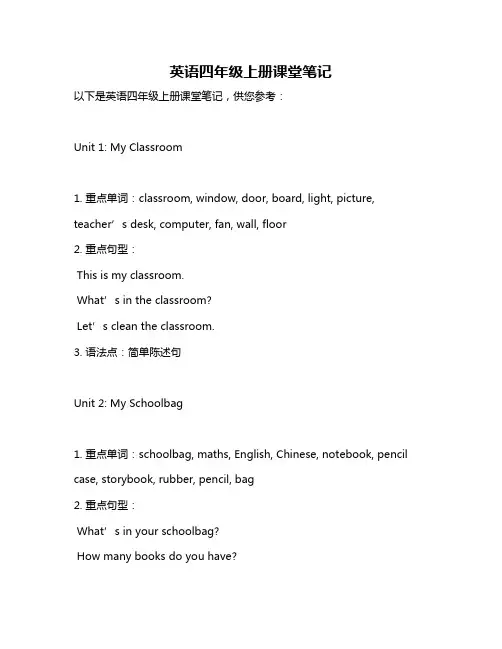
英语四年级上册课堂笔记以下是英语四年级上册课堂笔记,供您参考:Unit 1: My Classroom1. 重点单词:classroom, window, door, board, light, picture, teacher’s desk, computer, fan, wall, floor2. 重点句型:This is my classroom.What’s in the classroom?Let’s clean the classroom.3. 语法点:简单陈述句Unit 2: My Schoolbag1. 重点单词:schoolbag, maths, English, Chinese, notebook, pencil case, storybook, rubber, pencil, bag2. 重点句型:What’s in your schoolbag?How many books do you have?Do you like reading storybooks?3. 语法点:一般疑问句和特殊疑问句Unit 3: My Friends1. 重点单词:friend, tall, short, thin, strong, quiet, helpful, active, friendly, clever2. 重点句型:Who’s your best friend?What does he/she look like?What is he/she like?3. 语法点:形容词的用法Unit 4: My Home1. 重点单词:home, living room, kitchen, bedroom, bathroom, study, dining room2. 重点句型:Where is the TV?Is the table near the window?Please tidy up your room.3. 语法点:介词的用法和一般现在时态Unit 5: Dinner’s Ready1. 重点单词:dinner, soup, meat, rice, noodles, fish, vegetables, fruit, milk, water2. 重点句型:What would you like for dinner?I’d like some soup and rice.How much rice would you like?3. 语法点:祈使句和选择疑问句。
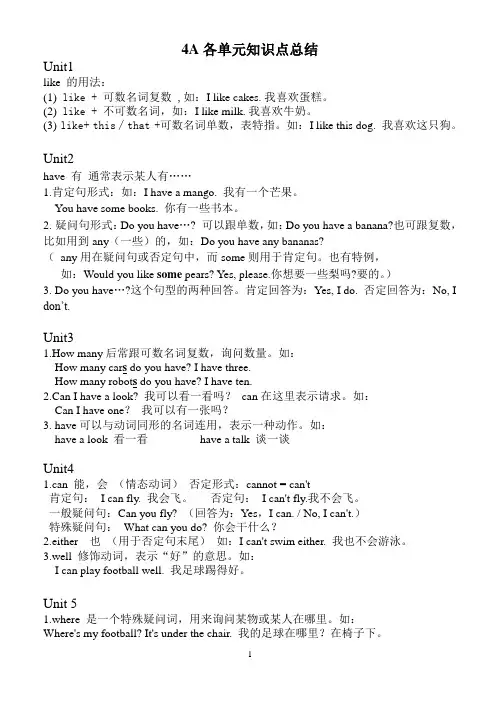
4A各单元知识点总结Unit1like 的用法:(1) like + 可数名词复数 ,如:I like cakes.我喜欢蛋糕。
(2) like + 不可数名词,如:I like milk.我喜欢牛奶。
(3)like+ this∕that +可数名词单数,表特指。
如:I like this dog.我喜欢这只狗。
Unit2have 有通常表示某人有……1.肯定句形式:如:I have a mango. 我有一个芒果。
You have some books. 你有一些书本。
2.疑问句形式:Do you have…? 可以跟单数,如:Do you have a banana?也可跟复数,比如用到any(一些)的,如:Do you have any bananas?(any用在疑问句或否定句中,而some则用于肯定句。
也有特例,如:Would you like some pears? Yes, please.你想要一些梨吗?要的。
)3. Do you have…?这个句型的两种回答。
肯定回答为:Yes, I do. 否定回答为:No, I don’t.Unit31.How many后常跟可数名词复数,询问数量。
如:How many car s do you have? I have three.How many robot s do you have? I have ten.2.Can I have a look? 我可以看一看吗?can在这里表示请求。
如:Can I have one?我可以有一张吗?3. have可以与动词同形的名词连用,表示一种动作。
如:have a look 看一看have a talk 谈一谈Unit41.can 能,会(情态动词)否定形式:cannot = can't肯定句:I can fly. 我会飞。
否定句:I can't fly.我不会飞。
一般疑问句:Can you fly? (回答为:Yes,I can. / No, I can't.)特殊疑问句:What can you do? 你会干什么?2.either 也(用于否定句末尾)如:I can't swim either. 我也不会游泳。
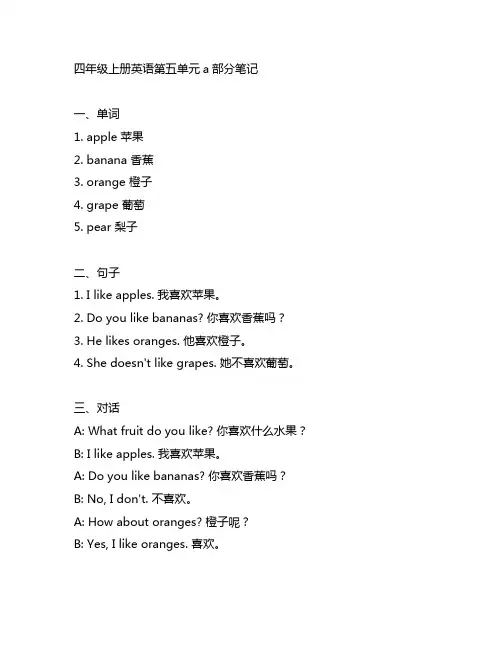
四年级上册英语第五单元a部分笔记一、单词1. apple 苹果2. banana 香蕉3. orange 橙子4. grape 葡萄5. pear 梨子二、句子1. I like apples. 我喜欢苹果。
2. Do you like bananas? 你喜欢香蕉吗?3. He likes oranges. 他喜欢橙子。
4. She doesn't like grapes. 她不喜欢葡萄。
三、对话A: What fruit do you like? 你喜欢什么水果?B: I like apples. 我喜欢苹果。
A: Do you like bananas? 你喜欢香蕉吗?B: No, I don't. 不喜欢。
A: How about oranges? 橙子呢?B: Yes, I like oranges. 喜欢。
四、语法1. like 的用法- like 作动词,表示“喜欢”,后面接名词或动词-ing 形式。
- 如:I like apples. 我喜欢苹果。
- 如:He likes eating oranges. 他喜欢吃橙子。
2. 句型:“Do you like…?”- 用于询问对方喜欢某种事物,肯定回答用“Yes, I do.”,否定回答用“No, I don't.”- 如:Do you like bananas? 你喜欢香蕉吗?- 如:Yes, I do. 喜欢。
五、练习题1. 选择填空(1) ____ you like apples? A. Do B. Does(2) I like eating _____. A. apples B. apple(3) ____ she like oranges? A. Do B. Does(4) He _____ like pears. A. do B. doesn't2. 句子连线(1) He likes grapes. A. 我喜欢苹果。
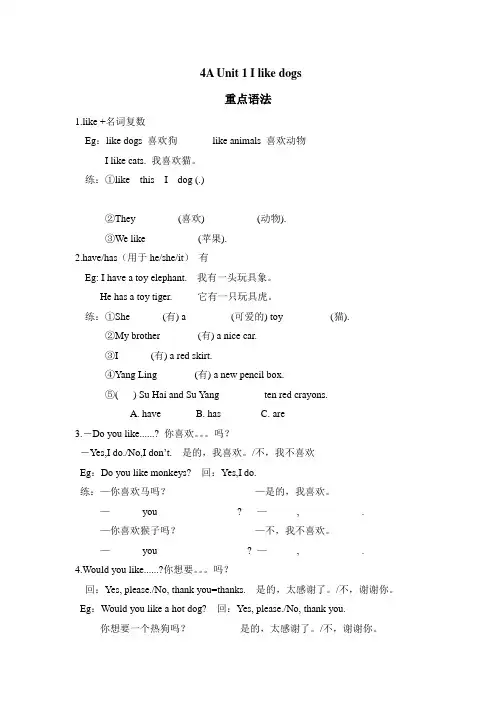
4A Unit 1 I like dogs重点语法1.like +名词复数Eg:like dogs 喜欢狗like animals 喜欢动物I like cats. 我喜欢猫。
练:①like this I dog (.)____________________________________②They ________(喜欢) __________(动物).③We like __________(苹果).2.have/has(用于he/she/it)有Eg: I have a toy elephant. 我有一头玩具象。
He has a toy tiger. 它有一只玩具虎。
练:①She ______(有) a ________ (可爱的) toy _________(猫).②My brother _______(有) a nice car.③I ______(有) a red skirt.④Yang Ling _______(有) a new pencil box.⑤( ) Su Hai and Su Yang ________ ten red crayons.A. haveB. hasC. are3.-Do you like......? 你喜欢。
吗?-Yes,I do./No,I don’t. 是的,我喜欢。
/不,我不喜欢Eg:Do you like monkeys? 回:Yes,I do.练:—你喜欢马吗?—是的,我喜欢。
—______ you _______ ________? —______,______ ______.—你喜欢猴子吗?—不,我不喜欢。
—______ you _______ __________? —______,______ ______.4.Would you like......?你想要。
吗?回:Yes, please./No, thank you=thanks. 是的,太感谢了。
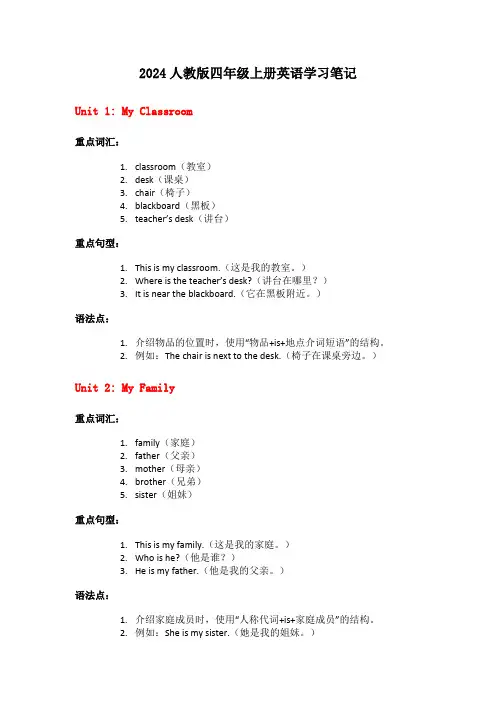
2024人教版四年级上册英语学习笔记Unit 1: My Classroom重点词汇:1.classroom(教室)2.desk(课桌)3.chair(椅子)4.blackboard(黑板)5.teacher’s desk(讲台)重点句型:1.This is my classroom.(这是我的教室。
)2.Where is the teacher’s desk?(讲台在哪里?)3.It is near the blackboard.(它在黑板附近。
)语法点:1.介绍物品的位置时,使用“物品+is+地点介词短语”的结构。
2.例如:The chair is next to the desk.(椅子在课桌旁边。
)Unit 2: My Family重点词汇:1.family(家庭)2.father(父亲)3.mother(母亲)4.brother(兄弟)5.sister(姐妹)重点句型:1.This is my family.(这是我的家庭。
)2.Who is he?(他是谁?)3.He is my father.(他是我的父亲。
)语法点:1.介绍家庭成员时,使用“人称代词+is+家庭成员”的结构。
2.例如:She is my sister.(她是我的姐妹。
)Unit 3: My Friends重点词汇:1.friend(朋友)2.best friend(最好的朋友)3.classmate(同学)4.play(玩耍)5.study(学习)重点句型:1.Who is your best friend?(谁是你最好的朋友?)2.My best friend is Tom.(我最好的朋友是汤姆。
)3.We play and study together.(我们一起玩耍和学习。
)语法点:1.介绍朋友时,使用“人称代词+is+朋友”的结构。
2.例如:He is my classmate.(他是我的同学。
)Unit 4: My School重点词汇:1.school(学校)2.library(图书馆)3.playground(操场)4.classroom(教室)5.canteen(食堂)重点句型:1.This is my school.(这是我的学校。
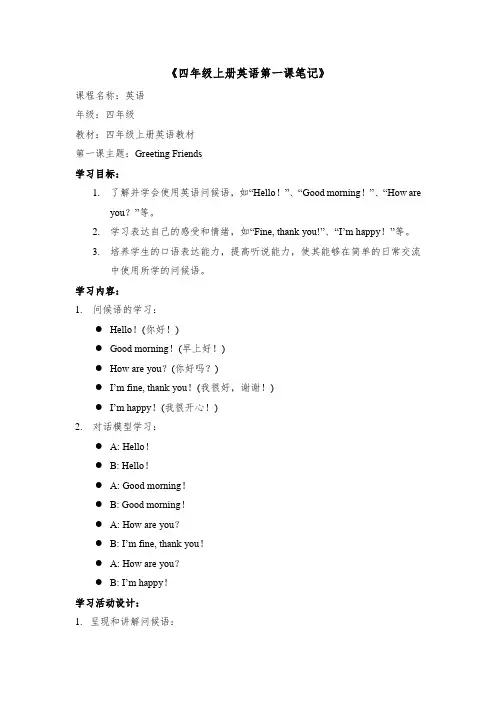
《四年级上册英语第一课笔记》课程名称:英语年级:四年级教材:四年级上册英语教材第一课主题:Greeting Friends学习目标:1.了解并学会使用英语问候语,如“Hello!”、“Good morning!”、“How areyou?”等。
2.学习表达自己的感受和情绪,如“Fine, thank you!”、“I’m happy!”等。
3.培养学生的口语表达能力,提高听说能力,使其能够在简单的日常交流中使用所学的问候语。
学习内容:1.问候语的学习:●Hello!(你好!)●Good morning!(早上好!)●How are you?(你好吗?)●I’m fine, thank you!(我很好,谢谢!)●I’m happy!(我很开心!)2.对话模型学习:●A: Hello!●B: Hello!●A: Good morning!●B: Good morning!●A: How are you?●B: I’m fine, thank you!●A: How are you?●B: I’m happy!学习活动设计:1.呈现和讲解问候语:●展示图片或卡片,用英语发音教学生学习问候语的发音和用法。
●引导学生模仿发音,帮助他们正确掌握语音语调。
2.角色扮演:●分为两人一组,一个扮演A,一个扮演B。
●学生之间进行对话练习,运用学到的问候语进行简单的交流。
3.听力训练:●播放录音,让学生听录音并尝试写出所听到的问候语。
●全班讨论并核对答案,帮助学生纠正错误并加深记忆。
4.小组活动:●分为若干小组,每个小组选择一位代表,两两对话展示自己的问候和回答。
●其他小组成员进行评价和指导,共同提高口语表达能力。
5.语音比赛:●以问候语为基础,设计一个语音比赛,让学生展示他们流利的发音和适当的语音语调。
●比赛结束后,进行点评和总结,给予学生肯定和鼓励。
总结评价:通过本节课的学习,学生能够掌握基本的英语问候语,能够正确、自然地使用这些问候语进行交流。
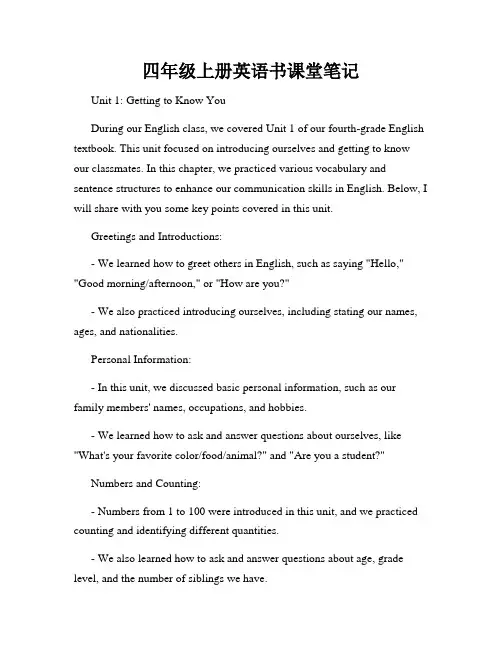
四年级上册英语书课堂笔记Unit 1: Getting to Know YouDuring our English class, we covered Unit 1 of our fourth-grade English textbook. This unit focused on introducing ourselves and getting to know our classmates. In this chapter, we practiced various vocabulary and sentence structures to enhance our communication skills in English. Below, I will share with you some key points covered in this unit.Greetings and Introductions:- We learned how to greet others in English, such as saying "Hello," "Good morning/afternoon," or "How are you?"- We also practiced introducing ourselves, including stating our names, ages, and nationalities.Personal Information:- In this unit, we discussed basic personal information, such as our family members' names, occupations, and hobbies.- We learned how to ask and answer questions about ourselves, like "What's your favorite color/food/animal?" and "Are you a student?"Numbers and Counting:- Numbers from 1 to 100 were introduced in this unit, and we practiced counting and identifying different quantities.- We also learned how to ask and answer questions about age, grade level, and the number of siblings we have.Daily Routines:- We talked about our daily routines, learning vocabulary related to activities we do every day, such as waking up, brushing our teeth, eating breakfast, going to school, and playing sports.- We practiced forming sentences using time expressions, such as "in the morning/afternoon/evening" and "at night."Classroom Objects and Commands:- Vocabulary related to classroom objects, such as books, pens, desks, and chairs, was introduced.- We also learned imperative sentences and commands, like "Open your book," "Sit down," and "Listen carefully."Basic Grammar:- We were introduced to simple sentence structures, such as subject-verb-object patterns, to construct basic English sentences.- The use of personal pronouns (I, you, he, she, it) and possessive adjectives (my, your, his, her) were also practiced.Listening and Speaking Activities:- Throughout the unit, we engaged in various listening and speaking activities, such as pair work and group discussions, to encourage conversation in English.- These activities aimed to improve our listening comprehension and oral communication skills.Overall, Unit 1 of our fourth-grade English textbook provided us with a foundation in English communication. It allowed us to become more confident in introducing ourselves, asking and answering questions, and engaging in basic conversations in English. By practicing the vocabulary and grammar covered in this unit, we are now better equipped to communicate effectively in real-life situations.As we proceed to the next unit, I am excited to explore more topics and continue improving our English language skills.。
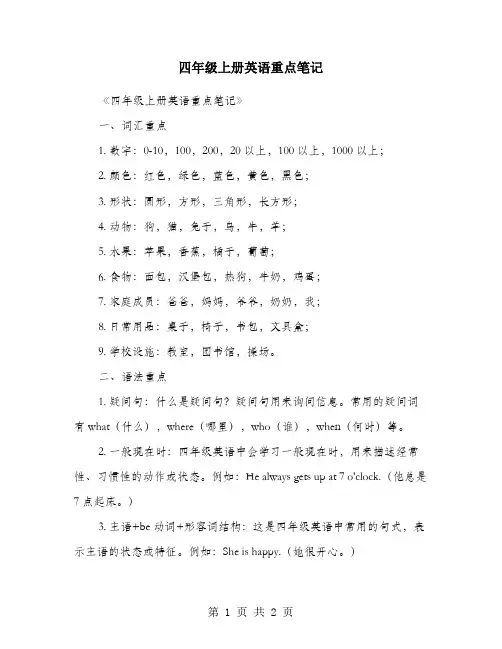
四年级上册英语重点笔记《四年级上册英语重点笔记》一、词汇重点1. 数字:0-10,100,200,20以上,100以上,1000以上;2. 颜色:红色,绿色,蓝色,黄色,黑色;3. 形状:圆形,方形,三角形,长方形;4. 动物:狗,猫,兔子,鸟,牛,羊;5. 水果:苹果,香蕉,橘子,葡萄;6. 食物:面包,汉堡包,热狗,牛奶,鸡蛋;7. 家庭成员:爸爸,妈妈,爷爷,奶奶,我;8. 日常用品:桌子,椅子,书包,文具盒;9. 学校设施:教室,图书馆,操场。
二、语法重点1. 疑问句:什么是疑问句?疑问句用来询问信息。
常用的疑问词有what(什么),where(哪里),who(谁),when(何时)等。
2. 一般现在时:四年级英语中会学习一般现在时,用来描述经常性、习惯性的动作或状态。
例如:He always gets up at 7 o'clock.(他总是7点起床。
)3. 主语+be动词+形容词结构:这是四年级英语中常用的句式,表示主语的状态或特征。
例如:She is happy.(她很开心。
)4. 主语+have/has+名词:这也是四年级英语中常用的句式,表示主语拥有某物。
例如:I have a dog.(我有一只狗。
)三、其他重点1. 听力训练:在英语学习中,听力训练是非常重要的。
多听英语录音带、看英语动画片都是很好的方法。
2. 阅读理解:阅读理解是英语考试中的重要部分。
要多读、多理解英语文章,提高阅读理解能力。
3. 口语表达:多与他人用英语交流、练习口语。
口语表达是英语学习中必不可少的一部分。
4. 单词记忆法:记忆单词是英语学习的基础。
可以使用多种方法如发音记忆、形象记忆等来记单词。
5. 书写规范:在英语学习中,书写规范也很重要。
要练习整洁、规范的英文书写。
总的来说,四年级上册英语的学习重点是词汇、语法、听力、阅读、口语表达、单词记忆法、书写规范等方面。
只要掌握了这些重点,相信同学们一定能够轻松应对英语学习中的各种挑战。
四年级上册英语笔记人教版亲爱的同学们,大家好!今天我将为大家分享一份四年级上册的英语笔记,这是我在教学过程中总结出来的重要知识点,希望对大家的学习有所帮助。
一、单词和短语首先,我们要掌握一些常用的单词和短语。
例如,“hello”,“good morning”,“goodbye”,“how are you?”,“I’m fine. Thank you.”等等。
这些日常用语在我们的生活中非常常用,一定要熟练掌握。
另外,我们还需要记住一些基础名词,如“apple”,“banana”,“carrot”,“egg”,“hamburger”等等,这些都是我们日常饮食中的常见物品。
还有一些动词短语,如“cut up”,“eat up”,“eat with”,“put away”等等,这些短语在句子中起到重要的作用。
二、句型结构其次,我们要掌握一些基本的句型结构。
例如,“I have …”,“He/She has …”等,这些句型结构是描述物品所有权的常用方式。
另外,“What’s this? It’s …”和“What color is it?It’s …”等句型结构则是用来询问和描述物品的。
还有一些疑问句,如“Is this a …?”,“What’s your name?”,等等,这些句型结构可以帮助我们更好地进行交流。
三、阅读理解在阅读理解方面,我们需要注重培养自己的阅读速度和技巧。
可以通过阅读一些简单的英语故事来提高自己的阅读能力。
同时,我们还需要注意一些基本的语法和单词拼写,以确保我们能够正确理解故事的内容。
四、写作技巧最后,我们要注重写作技巧的培养。
可以通过模仿一些简单的英语作文来提高自己的写作水平。
同时,我们还需要注意语法和单词的使用,确保我们的作文能够表达清楚自己的意思。
总的来说,四年级上册的英语笔记主要包含了单词、短语、句型结构、阅读理解和写作技巧等方面的内容。
只要我们认真学习,积极练习,相信大家一定能够掌握这些知识,并在英语学习中取得更好的成绩。
四年级上册重点笔记一、同音词1. four-for2. right-write3. too- two, to4. aren't- aunt5. meet- meat6. no- know7. pear- pair双,对8. why- y9. see- c10.where- wear 穿11.there- their12. tea- t13. are- r14. eye- i15. bee- be, b16. hair- hare野兔17.hour- our18. dear- deer19. sun- son20. you- u21. it’s-its二、同义词、同义句1. come from= be fromI am from China. = I come from China.He is from China. = He comes from China.Where are you from? = Where do you come from?2. I'm Jim. = My name is Jim.He’s Jim. = His name is Jim.She’s Ann. = Her name is Ann.You’re Ann. = Your name is Ann.It’s Mimi. = Its name is Mimi.3. How old are you? = What's your age?4. Nice to meet you.= Glad to meet you.= Happy to meet you.5. Nice to see you. = Glad to see you.= Happy to see you.6. I'm number five. = I'm Number Five.= My number is five.7. What's this in English?= What's the English for this?8. It's fine today. =It's nice today.= It's sunny today.9. It's sunny today. = It's a sunny day.10. How about you? = What about you?11. Shall we go swimming?= Let's go swimming, shall we?12. How's the weather today?=What's the weather like today?13. Put on your shirt. = Put your shirt on.14. Try on your jeans. = Try your jeans on.15. Can I help you? = What can I do for you?16. How tall the boy is! = What a tall boy he is!17.look like = be likeWe look like twins. = We are like twins.18. We look the same. = We are the same.19. show sb.(宾格)sth. = show sth. to sb. Show me that dress. = Show that dress to me.20. pass sb. (宾格)sth.= pass sth. to sb.Pass her those shoes. = Pass those shoes to her.21. go shopping = do some shopping22. What's the time?= What time is it?23. sure= certainly= of course三、反义词1. good - bad2. this- that3. these- those4. hot- cold5. warm –cool6. go - come7. yes - no8. here- there9. white - black10. happy -sad11. big - small12. long/ tall - short13. new -old14. late- early15. open -close四、名词单数变复数1. boy- boys2. girl- girls3. friend- friends4. student - students5. driver - drivers6. teacher - teachers7. farmer - farmers8. doctor -doctors9. nurse - nurses10.grade -grades11. pineapple -pineapples12. lemon - lemons13. apple - apples 14. pear -pears15. watermelon -watermelons16. orange -oranges (桔子)17. banana -bananas18. carrot -carrots19. cucumber -cucumbers20. eggplant -eggplants21. pepper -peppers22. kite -kites23. panda -pandas24. skirt -skirts25. shirt -shirts26. cap -caps27. hat -hats28. T-shirt - T-shirts29. blouse -blouses30. jacket -jackets31. raincoat -raincoats32. sweater -sweaters33. vest -vests34. sock - socks35. shoe -shoes36. postman - postmen37. policeman - policemen38. class -classes39. dress -dresses40. tomato -tomatoes41. potato - potatoes42. mango - mangoes43. mosquito - mosquitoes44. zoo - zoos45. photo- photos46. this - these47. that - those48. I - we49. me- us50. my - our51. he/ she/ it - they52. him / her/ it - them53. his/ her/ its - their54. am/ is - are55. fruit - fruit56. kiwifruit - kiwifruit五、现在分词1. count -counting2. drawing -drawing3. play - playing4. write -writing5. put - putting6. cut - cutting7. swim - swimming8. shop -shopping六、名词变形容词1. China - Chinese2. America - American3. England - English4. Singapore - Singaporean5. Canada -Canadian6. friend -friendly七、人称宾格形式1. I - me2. you -you3. he - him4. she - her5. it - it6. we -us7. they -them动词、介词后要用宾语:动宾介宾八、缩写1. I'm = I am2. he's = he is3. she's = she is4. it's = it is5. you're = you are6. we're =we are7. they're = they are8. that's = that is9. let's = let us10. what's = what is11. who's = who is12. where's = where is13. what're = what are14. who're = who are15. where're = where are16. there's = there is17. there're = there are18. how's = how is19. my mother is = my mother's20. Number = No.九、动词第三人称单数1. look -looks2. have - has十、特殊疑问代词1. what 什么2. what colour 什么颜色3. what class/ grade 班级/ 年级4. who 谁5. where 哪6. how 怎样十一、情态动词can / may + 动词原形十二、重点句子1. This is .... 介绍某人。
人教版英语四年级上笔记
以下是四年级上册人教版英语的一些重要知识点和笔记,供您参考:
1. 词汇:学习掌握有关学校、家庭、动物、颜色、数字等基础词汇,如“Hello”,“How are you?”,“I’m fine,thank you.”,“This is my friend,XXX”,“What’s your name?”,“My name is XXX”,“Nice to meet you.”,“Goodbye”等。
2. 语法:学习一般现在时,掌握动词be(am/is/are)的用法,学习使用第三人称单数动词形式,学习使用频率副词(always, usually, often,sometimes, never)等。
3. 语音:学习字母a、e、i、o、u在单词中的发音,学习连读、失去爆破
等语音规则。
4. 听说读写:通过各种形式的活动和练习,提高听说读写能力,培养英语交际能力。
5. 文化知识:了解英语国家的文化背景和习俗,如节日、食物、传统节日等。
以上是四年级上册人教版英语的一些重点内容,学生需要重点掌握。
同时,学生还需要注重实际应用,通过日常交流和练习来提高自己的英语水平。
四年级上册英语第一单元笔记一、引言本单元笔记是对四年级上册英语第一单元的学习总结,涵盖了该单元中的单词、短语、句型以及相关语法知识。
通过阅读此单元笔记,学生可以更好地理解和掌握英语表达方式,为以后的英语学习打下坚实的基础。
二、单词和短语1. 名词:课本(book)、铅笔(pencil)、橡皮(eraser)、学校(school)等。
2. 形容词:新的(new)、好的(good)、漂亮的(beautiful)等。
3. 动词:有(have)、在(at)、喜欢(like)、做作业(do homework)等。
4. 其他短语:一(one)、一些(some)、写作业(do homework)等。
三、句型结构1. 介绍新事物的句型:这是一本新书。
这些铅笔很漂亮。
我们学校很大。
2. 询问物品的句型:你有一些新的铅笔吗?他们在学校做什么?3. 表达习惯或日常活动的句型:我每天都有作业要做。
我喜欢在周末看书。
4. 特殊疑问句:你要写哪一本书?他们在哪里上学?你做了哪些作业?四、语法知识1. 名词的数和所有格:学生需要了解名词的复数形式,以及如何通过在名词后加上’s来构成所有格形式。
2. 形容词和副词的用法:学生需要学会如何正确地使用形容词来修饰名词,以及如何将形容词变为副词,并正确地使用它们。
3. 动词时态:本单元涉及的一般现在时和一般过去时,是小学英语中常见的时态。
学生需要了解如何通过使用助动词do/does来表达时态的变化。
4. 疑问句和否定句的构成:学生需要学会如何正确地构成疑问句和否定句,需要使用疑问词和否定词。
五、课堂笔记1. 重点单词和短语:book、pencil、eraser、school、new、good、beautiful、have、do homework、one、some、write等。
2. 重点句型总结:介绍新事物的句型、询问物品的句型、表达习惯或日常活动的句型以及特殊疑问句的使用方式。
3. 语法知识总结:名词的数和所有格、形容词和副词的用法、动词时态以及疑问句和否定句的构成方式。
上海版牛津小学英语:4A Module 1 Unit 1 学习笔记Module 4 Unit 1 Getting to know you Vocabulary(num.数词):eleven num. 11twelve num. 12thirteen num. 13fourteen num. 14fifteen num. 15sixteen num. 16classmate n.同学Sentences(句型):This is my ... His/her name's ...He's/She's ...He/She can ...Sound(音标):-------------------------------------------------------------练一练:This is your new classmate, Mary. ___ is ten yeas old. ___ student number is sixteen.A. He, HisB. Her, HerC. She. Her上海版牛津小学英语:4A Module 1 Unit 2 学习笔记Module 4 Unit 2 AbilitiesVocabulary(单词):paint:(用颜料)涂、画draw:画画read:读write:写swim:游泳jump:跳fast:(速度)快picture:图片very:很,非常well:(副词)好fly:飞high:高的Sentences(句型):Can he/she swim?Yes, he/she can. / No, he/she can't例句:Can Supergirl paint a picture? No, she can't, but she can run fast.Can she swim? Yes, she can swim very well.can you swim, Alice? Yes, I can. I like swimming very much。
Sound(音标): 读一读-sp: wa sp cri sp sListen! Little wa sp s.These are my cri sp s.please go away.It's not a good day for wa sp sTo play on my cri sp s.练一练:看图,选择任意一种动物,按照S1、S2的格式造两个句子。
上海版牛津小学英语:4A Module 1 Unit 3 学习笔记Module 1 Unint 3 How do you feel?Vocabulary(单词):happy adj.高兴的,幸福的hungry adj.饥饿的thirsty adj.口渴的sad adj.伤心的,难过的full adj.饱的,装满的tired adj.疲惫的new adj.新的back返回,回来biscuit n.小点心,饼干then然后Sentences(句型):How do you feel?I'm/We're ...Sound(音标): 读一读-st: toa st po st man lamp po stNear the lamp po st,There's a po st office.In the po st office,There's a po st man.The po st man in the po st officeIs eating a piece of toa st.--------------------------------------------------------练一练:Susie is ___ . She wants a large bottle of water.A. happyB. hungryC. thirsty上海版牛津小学英语:4A Module 2 Unit 1 学习笔记Module 2 Me, my family and friendsUnit 1 Jill's familyVocabulary(单词):father爸爸mother妈妈grandfather奶奶,外婆grandmother爷爷,外公uncle叔叔,舅舅aunt阿姨,姑妈cousin表兄妹,堂兄妹Sentences(句型):Do you have...?Yes, I do./No, I don't.(1)-Who's that man?-Oh, that's my uncle. He's my mother's brother. He's a police officer.(2)-Do you have brothers and sisters?-No, I don't, but I have a cousin. Do you have uncles and aunts, Peter?-Yes, I Do. I have one uncle and two aunts, and I have four cousins. Sound(音标): 读一读上海版牛津小学英语:4A Module 2 Unit 2 学习笔记Module 2 Me, my family and friendsUnit 2 JobsVocabulary(单词):看看上面的职业名称,你都认识多少呢?doctor n. 医生nurse n. 护士teacher n. 教师student n. 学生police officer n. 警察firefighter n. 消防员cook n.厨师bus driver n.汽车司机Sentences(句型):What does ... do? He / She is ...例句:(1) -What does your father do, Jill?-He is a firefighter.(2) -What does your mother do?-She is a nurse.(3) -What does your father do, Peter?-He is a teacher.(4) -What does your mother do?-She is a doctor.Sound(音标): 读一读练一练:根据以下句型参考造句子.S1: What does ... do? Is he/she ...?S2: Yes, he/she is a/an .../No, he.she isn't. He/She is a/an ...上海版牛津小学英语:4A Module 2 Unit 3 学习笔记Module 2 Me, my family and friendsUnit 3 I have a friendVocabulary(单词):coat n. 外套shirt n. 衬衫blouse n. 女衬衫T-shirt n. 体恤衫skirt n. 裙子sweater n. 毛衣jeans n. 牛仔裤shorts n. 短裤Sentences(句型):I have a friend. He/She has ...例句:I have a friend. His name's Tom. He's tall and thin. He has a green T-shirt anda pair of blue shorts. He can skate.I have two friends. They're Peter and his sister Sally. Peter has an orange T-shirt. He can ride a bicycle. Sally has a pink skirt. She can fly a kite.Sound(音标): 读一读练一练:I have two ___. They both have skirts.A. a friendB. friendC. friends上海版牛津小学英语:4A Module 2 Unit 3 学习笔记Module 2 Me, my family and friendsUnit 3 I have a friendVocabulary(单词):coat n. 外套shirt n. 衬衫blouse n. 女衬衫T-shirt n. 体恤衫skirt n. 裙子sweater n. 毛衣jeans n. 牛仔裤shorts n. 短裤Sentences(句型):I have a friend. He/She has ...例句:I have a friend. His name's Tom. He's tall and thin. He has a green T-shirt anda pair of blue shorts. He can skate.I have two friends. They're Peter and his sister Sally. Peter has an orange T-shirt. He can ride a bicycle. Sally has a pink skirt. She can fly a kite.Sound(音标): 读一读练一练:I have two ___. They both have skirts.A. a friendB. friendC. friends上海版牛津小学英语:4A Module 3 Unit 1 学习笔记Module 3 Places and activitiesUnit 1 In our schoolVocabulary(单词):canteen: n. 食堂,小卖部computer lab n. 机房,微机室office: n. 办公室gym: n. 体育馆behind: prep.(介词)在……的后面in front of: prep. 在……前面Sentences(句型):What's in your school / classroom / schoolbag ...? There is / are some ... in ...Sound(音标): 读一读fr-: fr uit gr-: gr andpa tr-: tr ee Gr andpa gr ows the fr uit,The fr uit on the tr ees.Gr andpa gives me some fr uit,The fr uit fr om his tr ees.练一练:1、There are ___ in the garden.A. a treeB. flower and plantC. many flowers and plants2、There is ___ in front of the classroom building.A. a gardenB. gardenC. gardens上海版牛津小学英语:4A Module 3 Unit 2 学习笔记Module 3 Places and activitiesUnit 2 Around my homeVocabulary(单词):supermarket: n.超市post office: n.邮局restaurant: n.饭店,小餐馆next to: prep.紧挨着between: prep.在……之间Sentences(句型):Is / Are there ...?Yes, there is /are. / No, there isn't /aren't.例句:(1)-Where is your home, Jill?-It's at No. 126, Garden Street. There are many shops near my home.-Is there a park near your home?-Yes, there is. It's behind my home.(2)-Where is your home, Miss Fang?-Guess. It's on a busy street in our city.-Are there any shops?-Yes. There are some shops, a supermarket, some restaurants, and a park.-Is it on Park Street?-Yes, it is.Sound(音标): 读一读sl -: sl ide sn-:sn ake sw-:sw ingCount the sn ake.There are eight.Two on the sw ings,Two on the sl ide.And four are sw immingIn the lake.--------------------------------------------------------练一练:1、___ there many shops near your home?A. AreB. DoC. Is2、There is a river ___ my home and the post office.A. betweenB. in front ofC. near上海版牛津小学英语:4A Module 3 Unit 3 学习笔记Module 3 Places and activitiesUnit 3 In the shopVocabulary(单词):a packet of sweet s 一包糖果a loaf of bread一条面包a bowl of noodle s 一碗面条a bar of chocolate一块巧克力a packet of biscuit s 一包饼干a bottle of water一瓶水Sentences(句型):How much is it / are they?It's / They're...对话:-A small packet of sweets, please.-Here you are.-How much is it?-It's twelve yuan, please.-And two ice creams, please. How much are they? -They're five yuan, please.Sound(音标): 读一读--------------------------------------------------------练一练:How much are the apples?A. It is 13 yuan.B. They are 13 yuan.C. They are 13 yuans上海版牛津小学英语:4A Module 4 Unit 1 学习笔记Module 4 The natural worldUnit 1 A visit to a farmVocabulary(单词):hay 干草 grass 草地,草坪corn 玉米 meat 肉,肉类Don't litter. 禁止乱扔垃圾Don't walk on the grass. 禁止践踏草坪Don't pick flowers. 禁止采摘花朵Don't throw stones. 禁止乱扔石头Sentences(句型):Don't ... 不要/禁止...对话:(1) -Good morning, children.-Good morning, Miss Fang.(2) -Don't litter on the farm.Please put the rubbish in the rubbish bin.-Yes, Miss Fang.(3) -Please don't walk on the grass. And don't pick flowers.-OK, Mr Macdonald.(4) -Yes, let's visit the farm.-Great! Let's go!Sound(音标): 读一读练一练:选出句子的意思:Don't walk on the grass!A. 禁止践踏草坪!B. 禁止乱丢垃圾!C. 禁止在此遛狗!上海版牛津小学英语:4A Module 4 Unit 2 学习笔记Module 4 The natural worldUnit 2 A Century GardenVocabulary(单词):sketchbook n. 素描本cap n. 帽子camera n. 照相机aviary n. 鸟类饲养场,大型鸟社fountain n. 喷泉pond n. 池塘Sentences(句型):Where is ...? It's ...Sound(音标): 读一读[ð]th-: this thatTh e children are playing in th e garden.Th ey like th is swing. Th ey like th at slide.Th ey can swing very high.Th ey can slide very fast.---------------------------------------练一练:where are the students?A. It is in the classroom.B. They are having lunch.C. They are on the playground.上海版牛津小学英语:4A Module 4 Unit 3 学习笔记Module 4 The natural worldUnit 3 WeatherVocabulary(单词):sunny晴朗的rainy下雨的cloudy多云的windy有风的warm温暖的wet潮湿的dry干燥的Sentences(句型):How's the weather in ...?It's ...对话:I…m Jill. I live in China. I have a friend, Amy. She is from Australia.Jill: It's sunny and warm here. How's the weather in Australia now? Amy: It's cool and windy.In May and June, it's always cool here.Jill: How's the weather in December then?Amy: It's sunny and hot.Sound(音标): 读一读练一练:How's the weather in summer?A. It's cold.B. It's hot.C. It's warm.上海版牛津小学英语:4A 语法总结之一——物主代词物主代词:表示所有关系的代词叫做物主代词。